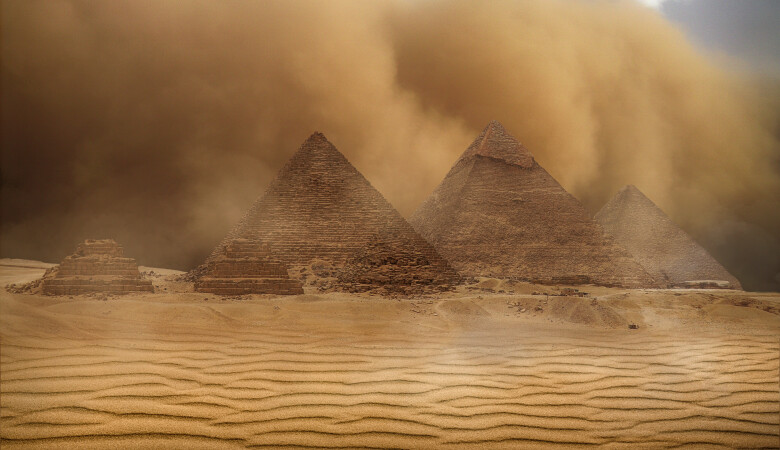God's Passionate Response to Sin Draws Forth Intercession - Part 2 (Isaiah Sermon 76 of 80)
January 29, 2017 | Andy Davis
Isaiah 63:1-64:12
Prayer
Andy Davis preaches a verse by verse expository sermon on Isaiah 63:1-64:12. The main subject of the sermon is intercessors and the coming of God's wrath.
- SERMON TRANSCRIPT -
I. An Urgent Call for Intercessors
Amen. Jesus said in the Book of Revelation, "I am the Alpha and the Omega, I am the first and the last, I am the beginning and the end." And so, in saying that, He gives us a sense of a sequencing of history, a beginning, a middle, and an end. An unfolding of sequential events in history that tells a grand and glorious story. And we need to understand that story based on the Word of God. And as we come for the second week to these two chapters, Isaiah 63 and 64, I am asking a lot of you, as a congregation today, we could do the easy thing, I could go to the famous verse that says, "All our righteous acts are like filthy rags." And I could preach the Gospel of saying, "Salvation is not by works, because our works are like... " I could do that, and there's an aspect of that, but that's not all that this chapter... That these chapters are saying.
So I'm want to challenge you to stay with me today, in terms of redemptive history, and understanding where Isaiah was at when he wrote these words, and what it was he was praying for and what he wanted to see happen going forward. And then step back and say, "Okay, where are we at in redemptive history? What principles can we take from these chapters that will enable us to get on board with what God is doing in our generation and the unfinished work yet to go?" So we're want to take timeless lessons from an immediate circumstance or situation in redemptive history and then move out. I'm called on, as a minister of the word, that I would study diligently 2 Timothy 2:15, that I might present myself to God as one approved, a workman who doesn't need to be ashamed, rightly dividing the word of truth. And I want to do that today in Isaiah 63 and 64.
So what do I think is happening? Well, let's go back a little bit in Isaiah 60, begin in Isaiah 60, and just move on just to get a running start into today's sermon. Isaiah 60 gives us an incredible vision of Zion. And it says, "Arise and shine for your light has come and the glory of the Lord shines upon you. Behold, darkness covers the earth and thick darkness is over the people, but the Lord rises upon you and His glory appears over you." And then, in the rest of that chapter, there's this river of glory flowing into Zion, this glorious city. And the language is so overwhelming and so glorious and so incredible that it just goes beyond anything that happened in the city, the physical city of Jerusalem. And so there's this prediction in Isaiah 60 of a glorious Zion.
Then in Isaiah 61, it begins with these incredible words, "The Spirit of the Lord is upon me, because the Lord has anointed me to preach good news to the poor, He has sent me to bind up the broken-hearted, and proclaim freedom for the captives, and recovery from darkness for prisoners, to proclaim the year of the Lord's favor, and the day of vengeance of our God. To comfort all who mourn, and provide for those who grieve in Zion." These words, as we know, were quoted by the Lord Jesus Christ Himself as He began His public ministry there, in His home town. And he was declaring himself to be the Anointed One, the Messiah, he said, "Today, in your hearing, this Scripture is fulfilled." And he announced the year of the Lord's favor, the year of His grace, He didn't mention, at that point, the day of vengeance of our God, but it's there in the text.
Then in the Isaiah 62, at the beginning of that chapter, we have, I think, Jesus speaking, just as he does in Isaiah 61. There He says, "For Zion’s sake, I will not keep silent, for Jerusalem's sake, I will not remain quiet, till her righteousness shines out like the dawn and her salvation like the blazing torch, and the nations will see your righteousness, and all kings your glory, and you will be called by a new name, that the mouth of the Lord will bestow. You will be a crown of splendor in the Lord's hand…. And no longer will they call you deserted or name your land desolate." So this is the vision that Jesus has, a passion in His heart, a burning passion for the final glory of Zion, whatever that means.
Now Zion, usually in the Old Testament, meant the City of Jerusalem, but here again, it just goes so far beyond the physical city of Jerusalem and what God had planned for that city, to something eternally glorious. What the Book of Revelation reveals is the new Jerusalem, it's want to descend from heaven, and it's radiant and beautiful and perfect. It is the people of God redeemed from every tribe and language and people and nation, it's the bride of Christ, and there's want to be a glorious wedding, a union of God with His people through Christ forever and ever. Isaiah 62. Now in Isaiah 62:6 and 7, it says, "I have posted watchmen on your walls, O Jerusalem. They will never be silent day or night, you call on the Lord, give yourselves no rest and give him no rest till he establishes Jerusalem, and makes her the praise of all the Earth."
And this I have seen to be a call for watchmen who stand on the walls of Jerusalem and look out into the darkness and see what's coming and call on the Lord, put him in remembrance. Which is an interesting thing because our omniscient God never forgets anything. But that's what we feel like in prayer, we're reminding God of His covenant promises, we're reminding God of the circumstances and the challenges that we face and we're praying on the basis of that. And so, I think, in Isaiah 63 and 64, we have patterns of that kind of prayer, that kind of intercessory ministry in light of the coming glory of Zion, the Eternal City of God.
II. The Lord’s Terrifying Day of Vengeance on His Enemies (63:1-6)
Now last week, we saw the vision in Isaiah 63, at the beginning of that chapter, of a blood-soaked warrior coming off the battlefield, not in any way weakened, not in any way ashamed of the slaughter, but a picture of the final wrath of God, "Who is this coming from Edom, from Bozrah, with his garments stained crimson? Who is this, robed in splendor, striding forward in the greatness of his strength? 'It is I speaking in righteousness, mighty to save.'" All those words are so poignant for us, there will come a Day of Wrath, a day of judgment a day of the Lord, and when he strides off the battlefield he will act in perfect righteousness and justice, and his actions will be for salvation.
It is I speaking in righteousness, mighty to save or to deliver my bride from all danger. And all of our enemies will be slaughtered, and I will have protected and rescued my bride and we will come into a place of perfect peace, and joy, and prosperity forever and ever. And so then there's this calling on the Lord, you who call on the Lord that you're posted on the wall spiritually, of Jerusalem, you can see it coming, you know what's going to happen and He's calling on you to pray, to put God into remembrance to give yourself no rest and to give him no rest till he finishes this salvation plan. Now as we get to 63 and 64 the rest of the chapter I just stopped right in the middle and we're just stepping through the intercession... You know Romans chapter 8 says "We don't know what we should pray for", we don't know how to pray.
And so we go to the Scripture and we know from Romans 8, the Holy Spirit teaches us what we should pray but he does it primarily through the word of God, and so we have a pattern of prayer here that we can just walk through and learn how to pray. And so he's talking about this at the end of 63, we can see the calling out that He does, Verse 15, 63:15, "Look down from heaven and see, from your holy and beautiful habitation. Where are your zeal and your might? The stirring of your inner parts and your compassion are held back from me."
He is praying, verse 16, "For you are our Father, though Abraham does not know us, and Israel does not acknowledge us; you, O LORD, are our Father, our Redeemer from of old is your name." And in verse 17, "O LORD, why do you make us wander from your ways and harden our heart, so that we fear you not? Return for the sake of your servants, the tribes of your heritage. 18 Your holy people held possession for a little while; our adversaries have trampled down your sanctuary. 19 We have become like those over whom you have never ruled, like those who are not called by your name ." And he cries out to God and then 64:1 "oh that you would rend the heavens and come down" and he's talking and he's saying, "Oh God, we're crying out to you, we're praying". So I think it's best to just bring these two chapters together and say This is Isaiah, praying, but he's also teaching us how to pray teaching future generations of the people of God, how to pray for redemptive history for what God is doing, but there's an immediate circumstance that Isaiah has in mind. So you go to the end of Isaiah 64 and there he says, verse 9, "Do not be angry beyond measure, O LORD; do not remember our sins forever. Oh, look upon us, we pray, for we are all your people." He's crying out.
But was he talking about? Look at verse 64:10 Your sacred cities have become a desert; even Zion is a desert, Jerusalem a desolation." Verse 11, "Our holy and glorious temple, where our fathers praised you, has been burned with fire, and all that we treasured lies in ruins." Verse 12 "After all of this oh Lord, will you hold yourself back? Will, you keep silent. And will you punish us beyond measure?"
So what we have to do now, this is why I'm asking a lot of you as a congregation, I want you to stick with me. Isaiah was writing at a certain moment in time. I don't know exactly when, in Isaiah's life he wrote this, but it was at a certain point I know for a fact that Jerusalem was never burned in Isaiah's lifetime, the temple was never destroyed in Isaiah's lifetime. Didn't happen. The Assyrians invaded, but they were killed at the walls of Jerusalem they didn't enter Jerusalem. So what is he talking about here? Well, he's able, by the power of the Holy Spirit of God to get up out of his circumstance and fly ahead in his mind, over a century later, when that this exact thing would happen and the Babylonians would do this.
And they would do it because God was judging the Jews for their sins, and he's crying for God beyond that to show himself mighty and powerful, and restore and rebuild Jerusalem, and destroy the enemies of the people of God. So that's what Isiah, 63 and 64, about. But we're way, way beyond that. We're centuries after that, happened. After Ezra and Nehemiah came after the exile of Babylon, was done and they came in they rebuilt Jerusalem, and it wasn't that impressive honestly, and Haggai, rebuilt the temple, and it just wasn't that impressive, but they got the nation up and running again and they became the Jewish nation. But these words just seem to go far beyond anything like that. Alright, so how do we, as 21st century American Christians get anything out of this? How do we read these chapters and benefit? Do we just know it's just a moment in history? And that happened back then and Isiah is very concerned about the rebuilding of Jerusalem or is there something bigger for us and I think there is. Jerusalem the City itself and the rebuilding of the animal sacrificial system, the temple and the whole thing was a type and a shadow, a prophecy acted out in space and time for a future reality that hasn't been fulfilled yet.
And we could learn how to pray about that. And some of these themes are still going today. God's wrath, His power, the seeming weakness and defeat of the people of God, our sinfulness our struggle with sin our crying out to God, for Him to build not even at that point, the physical lower earthly city of Jerusalem, but the ultimate New Jerusalem, that's coming. That's what's going on here. So now what I want to do is I want to just walk through this with you, and just from these just teach you teach us how to pray. And then try to apply it to our circumstances.
Now we've already seen that the backdrop here in 63:1-6, is the overpowering vision of the coming wrath of God. And then we began, last week, to see how are we going to persistently intercede? How are we going to be watchmen on the walls, who give ourselves no rest and give Him no rest, 'til He establishes Jerusalem and makes her the praise of the Earth? For us, we need to think now... We're not worried about the physical city of Jerusalem now, which Paul says in Galatians, the Jerusalem that's below is in slavery. We're talking about the Jerusalem that's above, and she is our mother. So the desire of building the heavenly Jerusalem, the building of the Church, the work of Jesus Christ, that's why... How do we pray for that?
III. Persistent Intercession and Lamentation by God’s Watchman (63:7- 64:12)
And this, I think, teaches us how to do it. First, in Verses 7-9, the intercessor recounts the Lord's history of love. He goes back over Jewish history. Look with me at 63:7-9, "I will tell of the kindnesses of the Lord, the deeds for which He is to be praised, according to all the Lord has done for us. Yes, the many good things He has done for the house of Israel, according to His compassion and His many kindnesses." So I want to talk about how good God has been to Israel and to us. I want to go... I want to start my prayer time by remembering the goodness and kindness of God to me and to the people of God. Start there. All of his many acts, and His compassion for us, and his many kindnesses. For us as Christians, we've got the same database, the same record of God's goodness to Israel that they had. And we can praise God for The Exodus. We can praise God for the Red Sea crossing. We can praise God for how he delivered them through the desert, and how they conquered the Promised Land. We can praise God for all the same thing, but we have a lot more things we can praise God for, too. For since Christ ascended, the Gospel has been irresistibly advancing from Jerusalem to Judea and Samaria into the ends of the Earth. And God's gospel now has reached you.
And you've seen all the goodness of God through Christ in your life and through the Holy Spirit. And he's done all these good things in your life so you can connect in the same way. You can celebrate the same thing the Jews did, but even more now. It's not either or, but it's both and for us as Christians. So I will tell of the goodnesses, the kindnesses of God. Start there in your intercession. God, thank you for being so kind to me. Thank you for all of the ways you've shown goodness, not just to me, but to all your people throughout the generations. Verse 8, he said, "Surely, they are my people, sons who will not be false to me." That's the adoption that we know in Christ. And so He became their savior. We have been adopted. We are like His Son. God said to Egypt, "Israel is my first born son. Let them go." And how it says in Deuteronomy, How God carried them as a son, as a father carries his son all the way you went until you reached his place. So that fatherly love for God. We know that, don't we? We've been adopted as His sons and daughters in Christ. We have the indwelling Spirit. And then that indwelling Spirit cries out, "Abba, Father," within our hearts. All right. "Surely, they are my people. They are sons who will be loyal to me." And so He became their savior.
Verse 9, "In all their distress, He, too, was distressed. And the angel of His presence saved them." We talked about that last week. That's Christ going forth in the pillar of cloud, in the pillar of fire. He's the Angel oh Lord. God's name was in Him. And he would not spare their rebellion. He would lead them and guide them, all the days of old.
The Intercessor Confesses Sin
But then next step, Verse 10, the intercessor confesses sin. "Yet they rebelled and grieved his Holy Spirit. So he turned and became their enemy, and He Himself fought against them." This is the regular pattern of the people of God. They consistently rebelled against the commands of God. They rebelled against God's Holy Spirit. And they didn't do all the things that God wanted them to do. And so God turned against them, to some degree, and became their enemy, and fought against them. We see this again and again in the Book of Judges where we'd have the Midianites invade, or the Philistines invade, or other Gentiles would invade. Ultimately, then, the Assyrians invaded. And they took away the northern kingdom. And then the Babylonians invaded, and they took away the rest. And this is what Isaiah is dealing with. Again, he can see ahead. He's already done with the Assyrian invasion, but the Babylonians are still to come.
And he's explaining why did God let the Babylonians burn the temple? It didn't make any sense why. Verse 10, they rebelled. They turned away. He fought against them. It's not an accident. It's not like God isn't powerful anymore. It's because he was disciplining them for their sins. They rebelled and grieved His Holy Spirit. So he turned and became their enemy, and Himself fought against them. So as watchmen on the walls, we have to do the same thing. As we come into the presence of God, it's not long before the Holy Spirit's want to start convicting you of sin. And you're aware of the sin in your life, and you're want to say, "I've rebelled. I have grieved the Holy Spirit. My sin is a grief to God." It says in Ephesians 5, "And do not grieve the Holy Spirit of God with whom you are sealed for the day of redemption." All of our sins brings God to grief. And so for us, as we're praying and you're interceding, the Holy Spirit's want to start showing you things in your lives. And you're want to have to say, "I have rebelled, and I deserve to be disciplined. I deserved to be judged." And so, that intercessory prayer goes to confession of sin.
The Intercessor Prays Based on the Lord’s History
Then in 63:11-14, he goes back to the Lord's history. It's a history lesson. "Then he remembered the days of old of Moses and his people. Where is he who brought them up out of the sea, with the shepherds of his flock? Where is he who put in the midst of them His Holy Spirit who caused his glorious arm to go at the right hand of Moses, who divided the waters before them to make for himself an everlasting name. Where is the one who led them through the depths? Like a horse in the desert, they didn't stumble like livestock that go down into the valley. The spirit of the Lord gave them rest. So you led your people to make for yourself a glorious name." Now, the intercessor is following God's own command to put him in remembrance. Remember, God, how you did that at the Exodus? Remember, where are you? Where is the God who did all that? I don't understand where you are.
So as he looks back, he remembers the deliverance of God at the Exodus. And he says, "Now... " Again, he's transported himself. Isaiah has, too. He's looking at smoldering Jerusalem, the temples destroyed, everything's... He said, "What happened to the God of the Exodus? I don't... Where did you go?" And then in the 7 years that followed during the exile, "God, it seems like you're not even here." And he's crying out, and he's interceding based on God's history. And He's reminding God of all that He did. This is what Moses did with the golden calf. Remember, he said, "God, please deliver your people. Please rescue them. You're the one who brought them out of Egypt. Don't kill them now, now that they've committed this sin, because Egypt will hear about that and you will lose honor and glory." So, that's how Moses interceded. Same thing with the 12 spies, when the 10 spies led the people in rebellion. And God said, "leave me alone, leave me alone, I'm want to kill them, I'm want to kill them all. I don't want to make of you, a great nation." Moses said, "but then the Egyptians will hear of it and they'll think you weren't able to bring your people into the promised land. Where are you, O God, the mighty God who led his people out of Egypt?"
Habakkuk 3:2, I love that verse. Habakkuk 3:2, says this, "Lord, I've heard of your fame…" "LORD, I have heard of your fame; I stand in awe of your deeds, O LORD. Renew them in our day, in our time make them known; in wrath remember mercy." I love that verse, isn't that great. God, I've heard your reputation, I've heard all the great things you've done. Do it again, do it in my life. Do it in my... Let me see your mighty hand. Let me see your deliverance. Do mighty things based on your past track record." Habakkuk 3:2. So many times, we struggle with that, don't we. We wonder why don't we see the mighty arm of God now. Why not? Why don't we see God just ripping apart human history for His glory, why don't we see God just do awesome miracles. And just... I've thought about that. We... I'm a trustee with the International Mission Board. We send missionaries and there's so much effort that goes into training them and funding them and all that. And they get out on the field and they suffer and they struggle and they get there and they get into some coffee shop and they share the Gospel with some person and the person doesn't come to Christ.
I'm thinking, Lord lead him to some elect person who needs to hear the gospel, after all of that effort, but God's ways are not our ways. We want to see God do mighty things, don't we? Want to see him do great things right in this community, right on the college campuses, we want to see him do incredible things. Renew those deeds in our time in wrath, remember mercy. Well, we know that if we're not seeing them now, it's not because God can't do it. God's past his prime, that was then, this is now, we all get old, we get over the hill that is not God. Our God is mighty and powerful. So that's not it. "Surely the arm of the Lord is not too short to save nor His ear too dull hear." That's not it.
Now, here, Isaiah's calling on God in light of this destruction that's going to come. Reminds me of Psalm 74. There it says, "Why have you rejected us forever O, God. Why does your anger smolder against the sheep of your pasture." And then he's talking about the Babylonians. He says, "They behave like men wielding axes to cut through a thicket of trees. They smashed all the carved paneling with their axes, and their hatches and they burned your sanctuary to the ground, they defiled the dwelling place of your name." So its definitely talking about the destruction of the temple there. Psalm 74. Then he says, "Why do you hold back your hand, your right hand? Take it from the folds of your garment. Its like God just sitting back and watching it happen, move out your mighty right hand and do something O God. Destroy them." So, he's interceding.
Look again in verse 11-13, "Where's he who brought them up out of the sea, with the shepherds of his flock. Where is He who put in the midst of them, His Holy Spirit, who caused his glorious arm to go to the right hand of Moses, who divided the waters before them. To make for yourself an everlasting name that led them through the depths." The God of the Exodus, the God of the Red Sea, let's see His power, let's see that happen. And look at the request, look at verse 15, "Look down from heaven and see from your holy and beautiful habitation, where are your zeal and your might, the stirring of your inner parts, and your compassion are held back from me." So he's asking God to look down and to show his zeal and his might. In verse 16, the intercessor pleads with God based on His unshakable covenant commitment, "You are our father though Abraham does not know us, or Israel does not acknowledge us. You, O, Lord, are our father, our redeemer from of old, is your name."
This is the basis of our prayers, as Christians, as well, "God, our Heavenly Father, you have made an unbreakable covenant with us. You've sealed it in the blood of Your Son our Lord and Savior Jesus Christ. You have done the infinitely hard work of redeeming rebels and making us your sons and daughters, now do the easy thing, finish our salvation. Finish our salvation. Despite Satan and his demons constant assault, O God, finish our salvation, get us through. Despite the incessant assault of the corrupt world system on our souls, O God, do the easier thing, get us through this dangerous place. O God despite our own flesh, the inner lust of our heart, that connects with Satan's work and connects with the world. O God, save us. Show us your power," that's how we pray.
The Intercessor Laments Over the Lord’s Disciplines
In verses 17 through 19, the intercessor, laments over the Lord's disciplines. He says, "O Lord, why do you make us wander from your ways and harden our heart, so that we fear you not. Return for the sake of your servants, the tribes of your inheritance. Your holy people held possession for a little while. Our adversaries have trampled down your sanctuary. We have become like those over whom you've never ruled like those who are not called by your name." This is incredible." He's saying we have wandered from your ways. We have hardened our hearts against the Holy Spirit, but what's really amazing the intercessor seems to be finding ultimate, I don't know responsibility of that with God. Why do you harden our heart so that we wander from your ways. Now, this is that infinite mystery of God's sovereignty in human responsibility. I pondered this a lot, even this morning. The book of James tells us this in James 1, when tempted no one should say, God is tempting me. For God cannot be tempted by evil, nor does He Himself tempt anyone, but each one is tempted one by his own evil desire, his own lust he is dragged away and enticed. So God's not to blame, but I think what this prayer teaches us is this. God is the only solution to a wandering hardened heart. It all comes down to what God will do.
God, would you please interfere with the ways of my hardened, wandering heart and would you please turn me back to your ways? I think that's how we're praying here isn't it? We're saying, "Oh God, my ways... ", like the hymn writer put it, "are prone to wander, Lord I feel it, prone to leave the God I Love." God, please, interfere with the workings of my heart. Please soften my heart, take out the heart of stone and give me the heart of flesh. That's what he's asking for. Now, in Verses 1-4 of 64, he's pleading with God to descend. Verse 1:64, I love, he says, "Oh that you would rend the heavens and come down." It's actually a very famous verse for those that pray for revival. Praying for revival, in the church. I love it, don't you? Oh, that you would rip apart the sky, rend the heavens, and come down. It implies that there's like this membrane between us and the spiritual realms, right? And if God would just rip it open and come out, we could see his mighty acts.
The Bible speaks of God creating the heavens, plural, and the earth, it's plural in the Hebrew. So there's this Heavens in a number of verses give us some hints of what that might mean. So you got the first heaven, that's the blue sky, where the birds fly, they fly through the heavens, that's the air, the atmosphere, all of that. That's the first heavens. Second heavens, I think, is outer space. You've got the sun, the moon, and the stars. That's that. The heavenly realms. But then the third heavens, now that's the spiritual realm. You know how Paul says in 2 Corinthians 12, "I know a man in Christ was caught up to the third heavens… caught up to Paradise." You have the same thing in Revelation Chapter 4, where John in the Isle of Patmos sees a door open, standing open in heaven, and he's invited and through the spirit, goes through the door and sees a throne with someone seated on it. He's invited into the heavenly realm.
So, when Isaiah is saying "Oh that you would rend the heavens" It's like "I wish that you would just rip that membrane between the physical world and the spiritual world, and come out and do something." Now he's asking here for a mighty warrior to come down.
Look at Verses 1-3. It says, "Oh that you would rend the heavens and come down, that the mountains would tremble before you, as when fire sets twigs ablaze and causes water to boil, come down to make your name known to your enemies and make the nations quake before you, for when you did awesome things that we did not expect, you came down and the mountains trembled before you." I can't help but think about Mount Sinai here, remember when God descended in a cloud and lightning and fire to the top of the mountain? And the whole ground was shaking beneath their feet, and they were terrified. This image of the power of God is like, "Oh God, that You would rip apart the heavens and come down like that, like a mighty earthquake, like a fire." You want God to step in and save the day.
Now, look all over the world, Christians are being persecuted. And you can imagine if you're incarcerated in North Korea. You're persecuted by the Korean government there. As a Korean Christian, you are caught by the communist government and you're being tortured every day. You can imagine, if you could remember, Isaiah 64:1, he's like, "Oh that you would rend the heavens and come down and deliver me, come down and kill my enemies and deliver me and rescue me, I'm crying out to you day and night for justice." Or you could see another persecuting nation like Iraq where Christians are persecuted from Islamic extremists or Eritrea, or Sudan and Somalia, also Iran, Afghanistan, Pakistan. So many places Christians cry out and yearn for God to rend the heavens and come down to rescue them. Perhaps, this is one of the most perplexing things to us Bible believing Christians. We see God's people suffering all over the world, it's like "God, why don't you do something, why don't you rip apart the heavens and come down and make the mountains shake and deliver your people?" But you know what's interesting? You get this exact image, this exact image at Jesus's baptism. It's amazing to me, I meditate on this.
In Mark chapter 1, Jesus was being baptized, and when he came up out of the water, it says in Mark 1:10 "At that moment as Jesus was coming up out of the water, he saw Heaven being torn open." The only one of the Gospels that uses that expression. Torn open, ripped open, only what came down wasn't a powerful overpowering image of a warrior. You don't get mighty God coming down with a sword, looking to kill. What do you get instead? A dove floating lower and lower, The Holy Spirit come down like a dove and he lands on this lamb Jesus, the Lamb of God, takes away the sins of the world and you get this voice, this peace loving voice "This is my Son, whom I love. With him I am well pleased." So this is the way I understand the rending of the heavens then. Between the first coming of Jesus, and the second coming of Jesus, that first rending is what we get. We get a ripping open and the Holy Spirit descending in peace and love and mercy. This is the year of God's grace, the year of his favor, and the enemies of God are treated very well and God is very patient with them. And his own people, their blood is poured out and the blood of martyrs is seed for the church and God withholds judgement because many of the most vicious persecutors are themselves elect. Like Saul of Tarsus, who will later be converted by the testimony of these slaughtered martyrs. And so instead of a powerful warrior coming down through the rending of the Heavens, we get this peaceful dove and this voice, God the father's voice, and we get Jesus the lamb.
We get the same thing at Stephen's death. Do you remember when he was being martyred, when he's dying? They're throwing stones for telling the truth. And it says Stephen, full of the Holy Spirit, looked up to Heaven and saw the glory of God and Jesus standing at the right hand of God. He saw the heavens rend, and he saw Jesus standing, and he said, "Look, I see Heaven open, and the son of man standing at the right hand of God." They didn't want to hear that, it made them even angrier. So they just are bearing down on him and killing him. And you know what he says, in a dove-like, lamb-like way, "Lord, don't hold this sin against them." And one of those consenting to his death was Saul of Tarsus. So, between the first and the second coming, we get the rending of the heaven and we get a dove, and we get grace and mercy. This is the year of the Lord's favor. So we understand 2 Peter 3:9 "The Lord is not slow in keeping his promise, as some understand slowness. He is patient with you, not wanting anyone to perish, but everyone to come to repentance."
So we should pray and we should pray, I think it's perfectly fine to pray for revival based on this. Before the heavens are rend and he comes down and makes the ground shake like a warrior, oh God, rend the heavens and pour out your Holy Spirit that we might be transformed, that we might preach the Gospel, that we might live lives worthy of the calling that we have received. Oh God, send forth your spirit for that.
God’s awesome power celebrated
Verse four and five, he says, "Since ancient times, no one has heard, no ear has perceived, no eye has seen any God besides you. You're the only God at work in human history, who acts on behalf of those who wait for him. You come to the help of those who gladly do right, who remember your ways." We are praying, like theists, not like deists. We are praying to a, if we can put it very wrongly, but I'll go ahead and put it, to an interfering God, a God who does come down and gets involved. We're not like the deists who said that God stays out of it, made the universe like a big clock and wound it up and stepped away, and just lets it run. He didn't get involved.
No, we're praying. We're praying to a God who acts on behalf of those who call on His name. And then the intercessor confessed his sin once more. Versus 5-7 "You come to the help of those who gladly do right, who remember your ways. But when we continue to sin against them, you were angry. How then can we be saved?" Psalm 66:18 "If I had cherished sin in my heart, the Lord would not have listened." So you're giving yourself no rest in Him, no rest, and He's convicting you of sin, and you're crying out to God, and He's showing you your sin. And you're saying, "Oh God, forgive me. God, I don't want to be a sinner. I want to see my life change. I want to see the lives of those around me change." You're praying like that, confessing sin.
Verse six and seven, very famous, "All of us have become like one who is unclean. All our righteous acts are like filthy rags. We all shrivel up like a leaf, and like the wind, our sins sweep us away. No one calls on your name, no one strives to lay hold of you, for you have hidden your face from us and made us waste away because of our sins."
How do we understand these verses? First, if I can just say to you who know yourself to be outside the Gospel, that you're lost. You cannot stand before such a holy God based on your own good works. They will look filthy. They are not acceptable, they cannot be used to pay for your sins. So I think that's valid. Come to Christ, trust in Christ. Your good works cannot save you, they cannot pay for your sins. But this is addressed to the people of God. It's like even our best works, as God's adopted people, are insufficient as a basis for us to intercede. They're not good enough, therefore we come, not in our name, but in the name of our mediator, Jesus Christ, and the basis of his perfect works, on the basis of His righteousness. He is the new and living way open for us into the presence of God. Our righteous acts are like filthy rags They're like garbage, like refuse, Paul said. Philippians 3: Even the best stuff I have to offer is not good enough.
Now, believe me, that doesn't mean we Christians can't do good works that will be rewarded by God on Judgment Day, that's not true. I do say they need to be purified. Do you remember how the God puts the fire to your works and the gold, silver, costly stones make it through the fire? I think that's just a symbol of him shining them up a bit. We don't do anything perfectly righteously, you know what I'm talking about. But I don't think we should take this verse to say we have no good works at all. I'm just saying they're not the basis of our standing before God, thank God.
Finally in verses 8-12, the intercessor pleads with God to act. He said, "Yet, oh Lord, You are our Father. We are the clay, you are the potter. We are all the work of your hand. Do not be angry beyond measure, oh Lord, do not remember our sins forever. Oh, look upon us, we pray, for we are all your people. Your sacred cities have become a desert. Even Zion is a desert. Jerusalem, a desolation, our holy and glorious temple where our fathers praise you has been burned with fire. And all that we have treasured lies in ruins."
Verse 12 "After this, after all this, oh Lord, will you hold yourself back? Will you keep silent and punish us beyond measure?" So just to sum up, this just kind of completes the whole section. He's praying like this, "Oh Lord, we, your sinful people, desperately need you to cover our sins and act on our behalf. Please, oh Lord, would you tear the heavens and come down to destroy our enemies, despite the fact that we deserve all the judgments you have wisely meted out to us. Please, oh Lord, no longer be silent or restrain your affections for us. Act, oh Lord."
So the intercessor turns to God, our Father. And we have two beautiful images, God the Father, God the potter. Aren't they both beautiful? "You're our Father, you adopted us. Don't give us over. Love us, cherish us. You're the potter, we're the clay. Shape us, oh Lord. Change us, and shape us, and make us what you want us to be."
It's also interesting that he asked God to have a selective memory here. "Remember all your mighty acts in the past, Oh God, please forget our sins. Would you please forget our sins, O Lord?" And that's what he's doing. He's like, "God, don't look to our sins. We know you're omniscient and you remember everything. But remember, your covenant commitments. Remember Christ, remember your mighty works in the past. Please cover our sins, do not forget our sins, do not remember our sins." That's what he's saying. And so Isaiah's prophetic vision over a century in advance moves him to teach us how to pray. He taught Daniel how to pray in Daniel 9. When he was in the exile of Babylon, he could have just taken this as a prayer manual and used it in Daniel 9. Look it up this is exactly how he prayed: "Oh, God, please forgive us, we are sinful. Please restore your people. Please rebuild the city, rebuild the Temple." But now we're past that. Now what we're saying is where are we at in redemptive history. We're your church. We're in the process of doing the Great Commission, but we're sinful, we're tangled up with the world, we're doing things that are grieving your Holy Spirit. Forgive us, O Lord. Change us, shape us. You're our father, you're the potter, work in us. Make us godly people. Transform us by your power.
IV. Applications
So what applications can we take from this? At first just stand in awe of the vision of God here. God is awesome. Our God is a God who can make the nations shake, he make them boil like water, he can melt them like wax. He's a mighty God. Just stand in awe of a God like this. Start there. Secondly, we need to embrace that there is a coming wrath. The heavens will be rent a second time, but there's no dove coming that time. This time there's an army led by a warrior, He's coming. And at the second coming of Christ there'll be no salvation. Not coming to save any, He's coming to deliver His church from enemies, but he's coming to bring wrath. As I said last week, embrace that doctrine. It is true. Tell people that now is the year of God's favorite. Today is the day of salvation. Tell them there's time, there's time, that they should repent and trust in Christ. And then intercede, be one of the watchmen that God has posted on the walls. Give yourself no rest. What that means is stretch yourself in prayer. I would just urge that if this afternoon you probably had plans, but instead spend an hour going through Isaiah 63 and 64 and praying for this church and for The Church to the ends of the earth, for the building of the New Jerusalem.
Pray for missions, pray for lost people, pray for your own heart, repent of your sins. Whatever God's showing you is sinful take time to pray. Pray based on God's history of love toward His church. Pray with humble confession of sin. Pray based on Christ's resurrection from the dead. Pray with a deep lament for our wandering ways. Pray for God to tear open the heavens and come down in revival even. Acknowledge that even our best acts would be unclean apart from the grace of God and ask God to move out powerfully to finish His saving work in the world.































